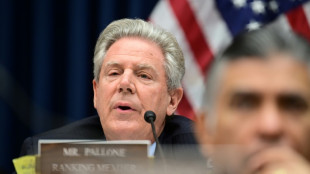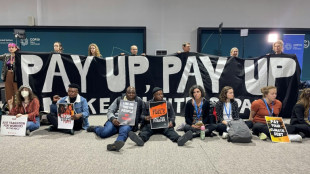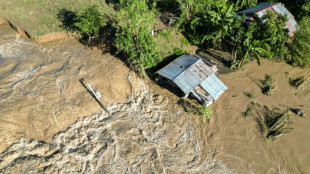
-
 Macron tells Xi he shares desire for 'durable peace' in Ukraine
Macron tells Xi he shares desire for 'durable peace' in Ukraine
-
Ruthless Japan beat China to move to brink of World Cup qualification

-
 French farmers threaten 'chaos' over proposed EU-Mercosur deal
French farmers threaten 'chaos' over proposed EU-Mercosur deal
-
Brazil arrests G20 guards over alleged 2022 Lula assassination plot

-
 China's Xi urges 'strategic' ties in talks with Germany's Scholz
China's Xi urges 'strategic' ties in talks with Germany's Scholz
-
Raducanu gives Britain lead on Slovakia in BJK Cup semis

-
 Russia says Ukraine fired first US-long range missiles
Russia says Ukraine fired first US-long range missiles
-
COP29 negotiators strive for deal after G20 'marching orders'

-
 Walmart lifts full-year forecast after strong Q3
Walmart lifts full-year forecast after strong Q3
-
British farmers protest in London over inheritance tax change

-
 NATO holds large Arctic exercises in Russia's backyard
NATO holds large Arctic exercises in Russia's backyard
-
Trouble brews in India's Manipur state

-
 Son of Norwegian princess arrested on suspicion of rape
Son of Norwegian princess arrested on suspicion of rape
-
Romanian court says 'irregularities' in influencer Andrew Tate's indictment

-
 Iran faces fresh censure over lack of cooperation at UN nuclear meeting
Iran faces fresh censure over lack of cooperation at UN nuclear meeting
-
Despondency and defiance as 45 Hong Kong campaigners jailed

-
 Scholar, lawmakers and journalist among Hong Kongers jailed
Scholar, lawmakers and journalist among Hong Kongers jailed
-
European stocks slide on fears of Russia-Ukraine escalation

-
 Police break up Georgia vote protest as president mounts court challenge
Police break up Georgia vote protest as president mounts court challenge
-
Spain royals visit flood epicentre after chaotic trip

-
 France's Gisele Pelicot says 'macho' society must change attitude on rape
France's Gisele Pelicot says 'macho' society must change attitude on rape
-
G20 leaders talk climate, wars -- and brace for Trump's return

-
 US lawmaker accuses Azerbaijan in near 'assault' at COP29
US lawmaker accuses Azerbaijan in near 'assault' at COP29
-
Tuchel's England have 'tools' to win World Cup, says Carsley

-
 Federer hails 'historic' Nadal ahead of imminent retirement
Federer hails 'historic' Nadal ahead of imminent retirement
-
Ukraine vows no surrender, Kremlin issues nuke threat on 1,000th day of war

-
 Novo Nordisk's obesity drug Wegovy goes on sale in China
Novo Nordisk's obesity drug Wegovy goes on sale in China
-
Spain royals to visit flood epicentre after chaotic trip: media

-
 French farmers step up protests against EU-Mercosur deal
French farmers step up protests against EU-Mercosur deal
-
Rose says Europe Ryder Cup stars play 'for the badge' not money

-
 Negotiators seek to break COP29 impasse after G20 'marching orders'
Negotiators seek to break COP29 impasse after G20 'marching orders'
-
Burst dike leaves Filipino farmers under water

-
 Markets rally after US bounce as Nvidia comes into focus
Markets rally after US bounce as Nvidia comes into focus
-
Crisis-hit Thyssenkrupp books another hefty annual loss

-
 US envoy in Lebanon for talks on halting Israel-Hezbollah war
US envoy in Lebanon for talks on halting Israel-Hezbollah war
-
India to send 5,000 extra troops to quell Manipur unrest

-
 Sex, drugs and gritty reality on Prague's underworld tours
Sex, drugs and gritty reality on Prague's underworld tours
-
Farmers descend on London to overturn inheritance tax change

-
 Clippers upset Warriors, Lillard saves Bucks
Clippers upset Warriors, Lillard saves Bucks
-
Acquitted 'Hong Kong 47' defendant sees freedom as responsibility

-
 Floods strike thousands of houses in northern Philippines
Floods strike thousands of houses in northern Philippines
-
Illegal farm fires fuel Indian capital's smog misery

-
 SpaceX set for Starship's next flight, Trump expected to attend
SpaceX set for Starship's next flight, Trump expected to attend
-
Texans cruise as Cowboys crisis deepens

-
 Do the Donald! Trump dance takes US sport by storm
Do the Donald! Trump dance takes US sport by storm
-
Home hero Cameron Smith desperate for first win of 2024 at Australian PGA

-
 Team Trump assails Biden decision on missiles for Ukraine
Team Trump assails Biden decision on missiles for Ukraine
-
Hong Kong court jails 45 democracy campaigners on subversion charges

-
 Several children injured in car crash at central China school
Several children injured in car crash at central China school
-
Urban mosquito sparks malaria surge in East Africa


Central Asian migrants eye Russia exit amid economic pain
Weeks after returning from Russia amid sanctions triggered by Moscow's invasion of Ukraine, Emomali Safarov has swapped construction tools for a video camera and his old low-paid journalism job in Tajikistan's capital Dushanbe.
He has not yet planned his next steps, but, for the moment, 24-year-old Safarov's feelings are those of relief as the Tajik national reflects on his hasty exit from Russia, just two days after the war with Ukraine began on February 24.
"I was speaking to migrants who have been working in Russia for 30 years. They told me that it is impossible to compare today's Russia with the Russia of old. The situation is very bad. Work has become very difficult," Safarov said as he filmed paralympic athletes in Dushanbe for a news outlet.
Hundreds of thousands of nationals of former Soviet countries in Central Asia are facing similar choices: shrinking work opportunities in Russia and wages in the weakened ruble versus a return to the homeland where they have family homes, but even fewer job prospects.
It wasn't always this way.
Russia's continuous economic growth during President Vladimir Putin's first two terms in office, powered by rising energy prices, set the stage for a swell of migration from countries like Tajikistan, where remittances typically equate to between a quarter and two-fifths of GDP.
But successive economic setbacks, most notably the double whammy of Western sanctions over the Kremlin's first invasion of Ukraine in 2014 and the oil price crash, have led to tighter margins for guest workers feeding families back home.
Since Russian forces poured into Ukraine the ruble has fallen by around a fifth, with Western forecasters predicting an economic contraction of between five and 10 percent this year and a continuing recession in 2023.
The World Bank in March forecasted that the real value of remittances sent to Tajikistan would fall by 22 percent this year, scrapping its pre-invasion forecast of a two percent rise.
For Safarov, the bleak economic outlook in Russia was compounded by police raids on his and other migrants' places of residence, which he said grew in frequency in the build-up to the invasion.
"We need to stop going to Russia in search of work. We need to find a path to work in Europe," Safarov told AFP.
- Remittances already falling -
Tajikistan, a majority-Muslim country of 9.5 million is the poorest of the 15 republics that gained independence from the Soviet Union in the 1990s.
Average monthly salaries hover around $100.
By earning up to $700 per month on building sites in Moscow and in Russia-annexed Crimea prior to the invasion, Safarov was able to send double that amount to his wife and child.
But women gathered outside a bank in central Dushanbe earlier in March told AFP that cash transfers sent by male relatives toiling in Russia were falling in local currency terms, despite the Tajik somoni sliding around 14 percent under pressure from the ailing ruble.
"(They have fallen) by 10 to 20 percent," said Nargis Mukhammedova, 44, who receives transfers from her son, a delivery worker in the Moscow region.
"My son says things there are getting worse. One day there is work, the next there isn't," said another woman, Zulfiya Aminova, 52, as a third woman began complaining about the rising cost of flour.
- 'Big worry' -
The economy of Tajikistan's neighbour Kyrgyzstan has even more exposure to the Russian labour market, according to World Bank data, with over four-fifths of total remittances sent from Russia in the first three quarters of 2021 compared to 58 percent in Tajikistan's case.
The World Bank's preliminary projection that the dollar value of remittances could fall by a third in Kyrgyzstan this year will alarm policy-makers in the mountainous, import-dependent country of just under seven million people.
Chynarkan Sydykova, a leading member of a Kyrgyz diaspora association in the Russian Siberian city of Novosibirsk, has returned to the Kyrgyz capital, Bishkek, to care for a family member.
She told AFP that compatriots still in Russia have bombarded her with phone calls, asking her about ways to return home and find work.
Western sanctions will hit Kyrgyzstan particularly hard, the 51-year-old warned, due to the prevalence of Kyrgyz workers in retail and hospitality in major Russian cities, where big-name brands such as McDonald's have suspended operations.
"We have over 100,000 unemployed here (in Kyrgyzstan). If (migrants) return, where will they work, how will they feed their families? This is a big worry," Sydykova said.
Y.Baker--AT
